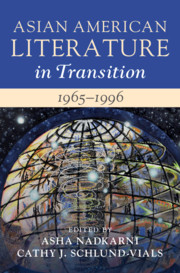Book contents
- Asian American Literature in Transition, 1965–1996
- Asian American Literature In Transition
- Asian American Literature in Transition, 1965–1996
- Copyright page
- Contents
- Contributors
- Series Preface
- Introduction
- Part I Immigration, Migration, and Movement
- Part II Politics, Art, and Activism
- Part III Institutionalization and Canon Formation
- Chapter 10 On Recovering Early Asian American Literature
- Chapter 11 Asian American Poetics
- Chapter 12 Maxine Hong Kingston’s The Woman Warrior: A Milestone in Asian American Literature
- Chapter 13 Making a Necessity of Extravagance: Work and Play in the Asian American(ist) Economy
- Chapter 14 Marking the Difference Made by “Heterogeneity, Hybridity, Multiplicity”: Lisa Lowe’s Impact on Asian American Studies
- Part IV Diaspora and the Transnational Turn
- References
- Index
Chapter 11 - Asian American Poetics
from Part III - Institutionalization and Canon Formation
Published online by Cambridge University Press: 08 June 2021
- Asian American Literature in Transition, 1965–1996
- Asian American Literature In Transition
- Asian American Literature in Transition, 1965–1996
- Copyright page
- Contents
- Contributors
- Series Preface
- Introduction
- Part I Immigration, Migration, and Movement
- Part II Politics, Art, and Activism
- Part III Institutionalization and Canon Formation
- Chapter 10 On Recovering Early Asian American Literature
- Chapter 11 Asian American Poetics
- Chapter 12 Maxine Hong Kingston’s The Woman Warrior: A Milestone in Asian American Literature
- Chapter 13 Making a Necessity of Extravagance: Work and Play in the Asian American(ist) Economy
- Chapter 14 Marking the Difference Made by “Heterogeneity, Hybridity, Multiplicity”: Lisa Lowe’s Impact on Asian American Studies
- Part IV Diaspora and the Transnational Turn
- References
- Index
Summary
The central argument of this chapter is that the poetry produced from 1965 to 1995 becomes legible as forming an Asian American poetics only about a decade after the period’s closing date. The chapter focuses on identifying and unpacking two foundational interpretive frameworks characterizing recent discussions of Asian American poetry. The first theorizes a crucial temporal discontinuity within the timeline of that poetry, beginning in the early 1980s with the publication of Theresa Hak Kyung Cha’s Dictee (1982). The second theorizes how contemporary Asian American poetics deploys this central discontinuity as a strategic necessity that allows a more flexible consideration of how Asian American poetry develops in parallel with the broader goals of the Asian American political movement, grounded in the late 1960s. Utilizing these two foundational frameworks, critical formulations of an Asian American poetics enact a subtle but significant transition away from discussions of the politics of race and representation, and toward a broader theoretical mapping of the politics of race as form, while nonetheless remaining committed to the sociopolitical project of Asian American studies.
- Type
- Chapter
- Information
- Asian American Literature in Transition, 1965–1996 , pp. 208 - 224Publisher: Cambridge University PressPrint publication year: 2021

